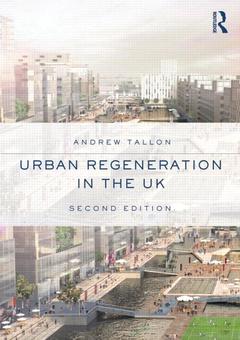Description
Urban Regeneration in the UK (2nd Ed.)
Author: Tallon Andrew
Language: English
Subjects for Urban Regeneration in the UK:
Keywords
CLG 2012a; gentri; UK City; cation; Gentri Cation; policy; Urban Regeneration; shef; Moon 1994a; eld; UK City Centre; moon; ODPM 2003a; 1994a; Shef Eld; bene; Urban Policy; central; Urban Regeneration Policy; government; Central Government Urban Policies; cities economic development; Central Government; UK urban regeneration; Whitehead 2004b; community-focused urban policies; Enterprise Zones; cities physical development; CLG 2011c; Urban White Paper; Green Eld Sites; 1980s Urban Policy; Development Corporations; Local Enterpri
Approximative price 61.25 €
In Print (Delivery period: 14 days).
Add to cartSupport: Print on demand
Description
/li>Contents
/li>Readership
/li>Biography
/li>
Striking transformations are taking place in the urban landscape. The regeneration of urban areas in the UK and around the world has become an increasingly important issue amongst governments and populations since the global economic downturn.
This textbook provides an accessible and critical synthesis of urban regeneration in the UK, analyzing key policies, approaches, issues and debates. It places the historical and contemporary regeneration agenda in context. The second edition has been extensively revised and updated to incorporate advances in literature, policy and case study examples, as well as giving greater discussion to the New Labour period of urban policy, and the urban agenda and regeneration policies of the Conservative-Liberal Democrat Coalition government elected in 2010. The book is divided into five sections, with Section I establishing the conceptual and political framework for urban regeneration in the UK. Section II traces policies that have been adopted by central government to influence the social, economic and physical development of cities, including early town and country and housing initiatives, community-focused urban policies of the late 1960s, entrepreneurial property-led regeneration of the 1980s, competition for urban funds in the 1990s, urban renaissance and neighborhood renewal policies of the late 1990s and early 2000s, and new approaches since 2010 which have sought to stimulate enterprise and embrace localism in an age of austerity resulting from the global economic downturn. Section III illustrates the key thematic policies and strategies that have been pursued by cities themselves, focusing particularly on improving economic competitiveness, tackling social disadvantage and promoting sustainable urban regeneration. Section IV summarizes key issues and debates facing urban regeneration in the early 2010s, and speculates upon future directions in an era of economic and political uncertainty.
Urban Regeneration in the UK combines the approaches taken by central government and cities themselves to regenerate urban areas, providing a comprehensive and up-to-date synthesis of the field. Each chapter also contains case studies, study questions, suggested further reading and websites, making this an essential resource for undergraduate students interested in Urban Studies, Geography, Planning and the Built Environment.
Section I. The Context for Urban Regeneration Chapter 1. Introduction: The Decline and Rise of UK Cities Section II. Central Government Urban Regeneration Policy Chapter 2. The Early Years of Regeneration: Physical Regeneration (1945-1968) and Social and Community Welfare (1968-1979) Chapter 3. Entrepreneurial Regeneration (1980s) Chapter 4. Competition and Urban Policy (1991-1997) Chapter 5. Urban Renaissance and Neighbourhood Renewal (1997-2010) Chapter 6. Regeneration in the Age of Austerity (From 2010) Section III. Transforming Cities: City-Level Responses to Urban Change Chapter 7. Urban Competitiveness Chapter 8. New Forms of Urban Governance Chapter 9. Community and Regeneration Chapter 10. Urban Regeneration and Sustainability Chapter 11. Retail Regeneration Chapter 12. Housing Regeneration and Gentrification Chapter 13. Culture and Regeneration Chapter 14. Regenerating Suburban and Exurban Areas of Cities Section IV. Conclusion Chapter 15. Urban Regeneration: Learning From the Past, Lessons for the Future
Andrew Tallon is Senior Lecturer in Urban Policy at the Department of Geography and Environmental Management, University of the West of England, Bristol, UK. His research interests include the fields of urban geography, urban policy and urban regeneration.
These books may interest you

Urban Regeneration in the UK 214.69 €



